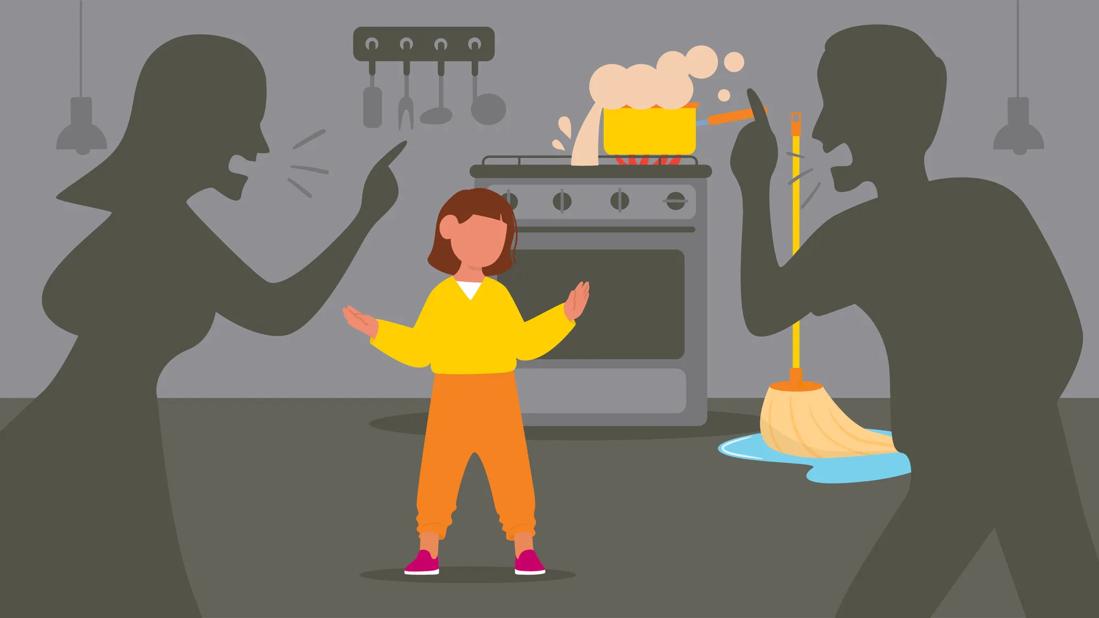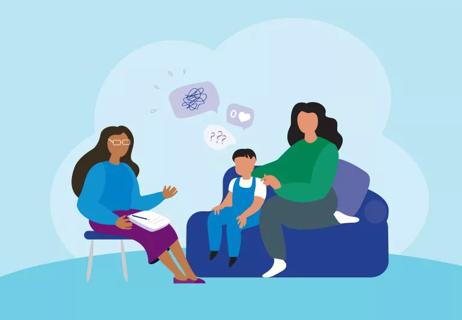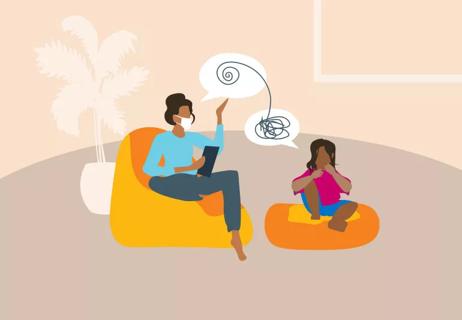Think of this behavior as a role reversal between parent and child — when a child takes on responsibility that’s not developmentally appropriate for their age

Everybody’s childhood is different. You may recall a “happy childhood,” but others may remember having to “grow up too fast.”
Advertisement
Cleveland Clinic is a non-profit academic medical center. Advertising on our site helps support our mission. We do not endorse non-Cleveland Clinic products or services. Policy
In some cases, you may have experienced “parentification,” which is when a child takes on the responsibilities typically reserved for parents, such as childcare, cooking and cleaning. And in some cases, you may become an emotional outlet for a parent.
“Parentification is when a child is assigned tasks that are really more appropriate and more reasonable for adults,” says psychologist Kate Eshleman, PsyD. “Think of it as a role reversal — a child is having to do tasks that aren’t developmentally appropriate.”
Let’s be clear: Some responsibility during childhood is a good thing. But in some families, a parent may be unable to take care of a child’s or family’s needs, and this may result in a child assuming a caregiver role.
There are many reasons why parentification may happen. A parent may have experienced neglect or abuse as a child, may have a mental health disorder or may have a substance abuse disorder. And sometimes, situations like getting divorced or financial hardships can place a child in more of a central caretaker role.
Dr. Eshleman talks about the impact parentification can have on adulthood and how to avoid “parentifying” your child.
Dr. Eshleman says there are two types of parentification: instrumental and emotional.
Advertisement
Instrumental parentification is when a child is responsible for tasks that aren’t age-appropriate, like paying bills or grocery shopping. Emotional parentification, on the other hand, is when a child becomes an emotional support system (such as listening, giving advice, mediating) for their parent. In some cases, a child may mask or downplay their own emotions so they don’t upset or take the attention away from their parent.
Often, instrumental and emotional parentification happen at the same time.
Signs of a parentified child may include both physical and emotional symptoms, including:
“When a child has physical complaints, there’s evidence that it can be related to their emotional health,” she notes. “For a young child or adolescent who may not have the ability to recognize their own emotions and stresses, it may manifest as physical symptoms.”
Dr. Eshleman adds that parentification can also lead to some positive attributes, such as being mature, responsible and caring.
“But overall, parentification can be difficult for the child. It doesn’t always allow kids to go through developmental phases if they’re having to provide either logistical, tangible or emotional support to a parent or to others,” she clarifies. “If a child is having to take care of things within the home, then they’re not spending time with friends. They may not be focused on their studies. They may not be doing the things that are typical and expected for their age.”
You may think parentification may sound a lot like another trendy term, like “eldest daughter syndrome,” when the firstborn daughter feels an extra sense of responsibility when it comes to caring for their siblings. But Dr. Eshleman says there’s a difference.
“The primary difference is related to the emotional aspect of parentification. With eldest daughter syndrome, it’s more of the tangible or logistical tasks that the eldest daughter is responsible for: caring for a younger sibling, having to do tasks around the house,” she explains. “Whereas, in parentification, the child also has to take care of the emotional needs and responsibilities of the parent.”
“What happens in childhood for anybody, positive or negative, can shape how we expect things to be in the future,” says Dr. Eshleman. “If a child is having to engage in this parentification role, that becomes their expectation about how parent-child dynamics work and how dynamics with others work.”
This can lead to challenges in adulthood and how someone forms and values relationships in their life. You may find it hard to identify and share your own feelings, have a lot of self-blame or guilt, or feel depressed or anxious. You may also have trust issues, and parentification may affect how you parent your own children.
Advertisement
But it’s also worth mentioning again that there can be a silver lining to parentification. You may have developed a good sense of your strengths and personality, know how to be empathetic and find you enjoy being in a caretaker role.
Now that you know more about parentification, you may think there’s a fine line between giving your child responsibilities and parentification.
“It’s appropriate for kids to have chores around the house. It’s still OK to ask kids to load and unload the dishwasher and to care for younger siblings at times,” says Dr. Eshleman.
But she says if you find that over the course of several months that there’s been a role reversal between you and your child, you can work your way back. So how can you avoid parentification? Dr. Eshleman offers the following advice:
Advertisement
Life is full of ups and downs — and if you have a child, it can be easy to lean on them to help with household chores, take care of a sibling and listen to you about the bad day you had at the office. And while many times, this is appropriate behavior within a family, sometimes, it can veer into parentification — and place too much responsibility and burden on your child.
“In a family, it’s important for everyone to work together, support each other and depend on one another,” encourages Dr. Eshleman. “Though the goal is for parents to be managing the majority of both the tangible and logistical tasks within the household, as well as supporting the children, more than the other way around.”
Advertisement

Sign up for our Health Essentials emails for expert guidance on nutrition, fitness, sleep, skin care and more.
Learn more about our editorial process.
Advertisement

A glass child is the sibling of someone with special needs — often seen as the easy one, but carrying invisible burdens

Appetite changes, social isolation, repetitive behaviors and more may indicate that your child is struggling

Golden children often deal with perfectionism, low self-esteem and strained relationships as adults

Tantrums and meltdowns are normal, but you can help your child manage their bigger emotions

American teens are facing unprecedented rates of depression and suicide, but you can be there to support and help them

Unexplained injuries, mood changes and sudden isolation may be signs your child needs help

Be involved in your kid’s care, but be mindful of boundaries

Look for comfort, fit and a feeling of partnership

Although it could be used as a moisturizer, this new trend is not recommended

Communicating clear limits helps protect your time, energy and emotional well-being

High cholesterol can be genetic, but testing and treatment can lower your heart disease risk